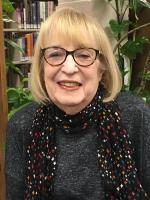
Johnson County Library and The Writers Place are pleased to announce that Peggy Epstein has won the essay category of our writing contest on the theme of WOMEN'S VOICES with "Wordless".
My writing career has been crazily eclectic: two parenting books published by McGraw-Hill and Capitol Books; four locally produced musicals (with my partner, composer Allen Epstein)--one for the Kansas City Fringe Festival; 30 or so fiction/essays for various magazines and journals; dozens of features for the Kansas City Star, hundreds of pieces for the on-line site, Demand Studios, and, most rewarding to me: the sample writing pieces I created over the years for my high school English students.
WORDLESS
To me she was simple.
I never considered her broken English as limiting her, that complex ideas, unspoken anxieties or longings, perhaps even profound opinions could be irretrievably buried, ideas that she might have expressed in Yiddish but could never convey in her limited grasp of her second language.
To me it wouldn’t have mattered anyway; I wouldn’t have cared to hear about any of that. As a self-absorbed child, I was content. All that mattered to me was that I had my Bubbie’s attention. My needs were paramount; I never considered, or cared, that she might have thoughts she couldn’t express.
Rose Gorelick came from Minsk to Omaha in 1915 at the age of twenty, but at sixty she still struggled to get by with heavily accented, simple English words, nearly always fortified with Yiddish.
Some nights, with my grandfather’s snores resonating from his room down the hall, I would lie next to my grandmother in the dark and before falling asleep quiz her on how to say words from “the old country.” A Yiddish vocabulary lesson every night I spent with her brought us no closer to real communication. Learning that “maidelah” meant “girl” told me nothing about her girlhood memories, or if she had an opinion about girls’ inequality, or about her hopes for me, her oldest granddaughter.
On these sleepovers Bubbie and I rocked on the porch swing late into the night, peering down Sherwood Avenue past the Fairfax Apartments on the corner and across Sixteenth Street, where the neon-lit bar provided free theater as patrons clustered outside, went in, came back out.
One night I asked Bubbie about a sign I had seen that day in the bar’s window.
“Why won’t they let minors in?”
“Who says that?” she asked.
“The sign on the window says ‘No minors allowed.’ Is that because they’re dirty from digging in the mines all day?” I asked. “That doesn’t seem fair. Maybe they even take a bath before they come.”
Neither of us knew it was an English language mystery. Some day I would know. She never would.
Sixty years later, my twelve-year-old grandson thinks his mother is simple.
When Teddy was five years old, our daughter suffered a massive stroke, leaving her unable to walk, to care for herself, and most devastatingly, unable to speak.
All expressive methods of communication were instantly snatched away that terrible night. Although her basic cognitive skills were left fairly intact, Amy is totally aphasic, and, in addition to not being able to speak, she cannot read or write or even differentiate among basic line drawings.
But in her job as a social worker, effective communication had been the most vital element of her profession. And, ironically, she was the “talkiest” member in our extended family; engaging relatives in long, long distance phone calls was one of her greatest pleasures.
There is no true conversation now; communication is exhausting for all parties, with her replies limited to “yes,” “no,” or “I don’t know.”
One day recently, Teddy remarked, “Mommy can’t really be herself because she can’t talk.”
I was taken aback by his remark, instantly transported back to my Bubbie’s side, stunned by the realization that when I was a child I had made no such observation about my grandmother. I was certainly never concerned with my language-challenged Bubbie “being herself.” Her severely limited ability to speak English was simply a part of who she was.
But his mother’s unspoken thoughts definitely concern Teddy.
“What do you think Mom remembers about me when I was a baby?”
“What do you think Mom dreams about?”
“What does Mom think I’ll be when I grow up?”
Although it is impossible to know the answers to these questions, I do know, that like Bubbie, if Amy had the words, she would tell him the answers and so much more.
But she cannot answer his questions or initiate any conversations or express any feelings. Consequently, only a few friends and relatives are willing to make the effort to communicate with her, and her inability to make herself understood colors most people’s perception of who she is.
No matter the reason, to be wordless is to be anonymous. To be wordless diminishes us. If we cannot reach out with words of appreciation, of curiosity, of explanation, of doubt, of support, of congratulations, of love, how can others truly know who we are?
On the day my son was born, our entire extended family gathered at the hospital to celebrate the event.
A nurse singled out Bubbie. “Well Mrs. Gorelick,” she said. “How does it feel to be a great-grandmother?”
“Vell . . .” Bubbie said, searching for words. “Is . . . is . . .”
“Never mind,” the woman said, briskly turning to leave the room.
My grandmother accepted the slight because experience had taught her that she would always be treated as she was heard: as a simple woman.
